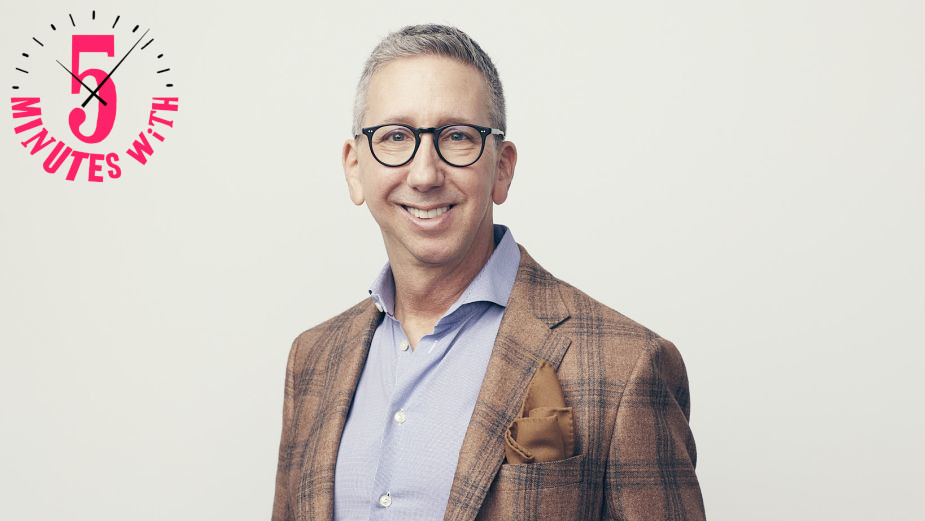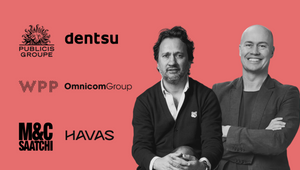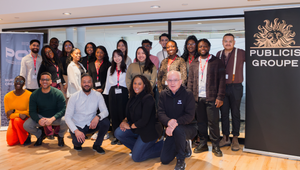
5 Minutes with… Arthur Fleischmann

Arthur Fleischmann co-founded Canada's john st. advertising in 2001. As the agency grew, it became one of the country's best independent agencies and caught the attention of WPP, which it joined in 2013.
To this day, john st. remains one of WPP's largest and most successful agency brands in Canada. What's more, in 2019 Arthur's role expanded to group CEO, overseeing operations across john st. as well as fellow WPP agencies Ogilvy and Ogilvy Health Canada. In January 2021, Arthur's role grew again: he is also now country manager, overseeing all of WPP's communications and technology offerings in Canada.
Arthur's role as a country manager for the world's largest holding company is an intriguing turn of events considering that path began with him successfully founding and running an independent agency. He is also born and raised in the United States, despite spending the majority of his advertising career north of the border.
Two of many reasons that LBB's Addison Capper was thrilled to pick his brains on the industry.
LBB> How did you get started in advertising?
Arthur> I started client-side. I was at a company that was called General Foods, and then it became Kraft, and then it split into Mondelez and Kraft. After that, when I moved to Canada, I tried advertising. My intention was for it to be a one or two year thing, but advertising just got in my blood. I liked the pace and variety.
LBB> Tell us more about your move to Canada. How do think the markets compare to each other?
Arthur> The US has to cater to a very odd market. They've got the Bible Belt, the Rust Belt, and then you've got the red states and blue states… by the time you're done, a lot of the work is quite homogeneous. Because of that, a lot of the good work that we see coming out of the US is often NFP or charitable work done for the award show circuit.
On the other hand, Canada is more centrist. It's more urban - the population lives in three very concentrated urban centres across the country. I don't mean we're dismissive of our Prairies, but they don't drive our decision making the way Montreal, Toronto and Vancouver do, and I think that makes our work a little more interesting. We're more European in our style. But, we generally don't have the budgets, so it's fairly scrappy and interesting.
LBB> You mentioned the big three cities, and you’re based in Toronto. What are your thoughts on Toronto as a city?
Arthur> I'd also say that we're a much more diverse market, which a few years back started to work its way into the creative agency. Our teams are more diverse. 50% of Torontonians were born outside of Canada and we strive to recruit staff that matches our population. It might be the most diverse city in North America. This highly diverse market drives more innovative thinking, even on smaller budgets. But beyond that, it's a very well-developed and sophisticated city. We export a lot of great talent, which also means we have a grip on a lot of great talent. I'd also add that I don't think we play safe, and I think we're mentally and spiritually - in some ways - tied to Europe, and therefore have a bit of a European sensibility when it comes to storytelling.
LBB> Generally, what are your thoughts on the strength and stature of Canadian advertising now versus when you opened john st.?
Arthur> In the case of john st., we built it with fantastic talent. A lot of them did leave for opportunities in LA and New York, but some have since come back. Anecdotally, I think this might be a trend. Recently, I've started to get a lot more emails from Canadians who have gone abroad and are now looking to come back. This is exactly the case for the new chief creative officer at Ogilvy, Francesco Grandi. His last position was global creative director on Dove in London, but he's just come back to Canada. Another example is Wain Choi, an ECD at Zulu. He spent a chunk of his career in Asia, and now he's back.
However, while I think we're starting to get some of the great talent back, we're certainly not out of the woods. The turnover in our industry is 30 or 35%. I'm not quite sure where creative writers and art directors are going (because it's a more narrow craft than something like account service where you might leave and go client side), but what I'm especially concerned about is the pipeline.
Are we an industry that looks appealing enough, prosperous enough and promotable enough that we’re attracting great, young talent in the 22 to 24 years old range? I'm willing to bet that the industry is not as sexy as it was 20 years ago. In part, I blame that - in Canada specifically - on how hard it is for us to keep up with the salaries of other industries. Also, a lot of work has moved to either mid funnel or end of funnel, and there's lots of talk about programmatic and pushing out highly targeted content. Unless we do a better job creating interesting content here, we’ll lose both consumer and employee interest.
LBB> Tell us more about the talent problem - what can the industry look to do better?
Arthur> This problem gets deeper and deeper. Aside from looking at if we're attracting talent, we have to ask if we're attracting diverse talent. In this vein, we recently did some research at Ogilvy which indicated that Canada’s young Black population, while interested in advertising, believed that advertising wasn't interested in them. They thought that advertising was for “cool, young white people.” As such, it's clear that we've not done a good job of demonstrating that this is an industry welcoming of all ethnicities, shapes, sizes, sexual orientations and gender identities. We have to do much better at that. We're making progress, but it's going to be a slow build. This isn't just a WPP problem, and it's not just an independent agency problem. Getting talent into this industry is an everyone problem.
LBB> You're the founder of an independent shop, but now serve as the country manager for the biggest holding company in the world. How does that independent spirit inform how you manage your WPP role?
Arthur> When I took on the job, one thing I noticed almost immediately is that we, as leaders, were not taught entrepreneurism. I was privileged to have a strong academic background that included finance, marketing, economics and an MBA. But I had to learn to be an entrepreneur in the real world. This is something I've noticed missing in a lot of leaders. 'Entrepreneur' is a big word. But to boil it down, entrepreneurs seek opportunities in the midst of turmoil. If an entrepreneur doesn’t sell and grow, they don't eat. It’s as simple as that – if we don’t make money for the company, we don’t have a paycheque for the staff and partners. We had to really sweat it. There was no plan B.
Entrepreneurs are tenacious and that does not necessarily exist in corporate Canada. So the one thing I'd like to look at next year is to set up a centre for entrepreneurship at the campuses. I’ve reached out to several of our universities to gauge interest. If a group of our leaders participated in this, I think we could reinvent within systems and learn to be scrappier in decision making.
Entrepreneurs resist victim mentality; blaming their corporate ecosystem for hurdles that restrain their business. History is full of stories of people overcoming massive challenges far bigger than corporate structure and holding companies. That can-do attitude is the spirit of entrepreneurship, it’s the heart of entrepreneurship, and I would love leaders to have more of that.
LBB> You mentioned victim mentality. How does the frequency of it differ between independent and network agencies?
Arthur> I think it's very easy to blame the network. I'm not saying we're perfect, and perhaps independents do have some advantages. But networks have huge advantages as well. Independents often lack resources. And whether you're making money for the partners or you're making money for the shareholder the goals are quite similar.
At the end of the day, independent or not, we all have to be profitable and run a smart business. But what I'm finding at WPP is we have massive resources, like proprietary research tools and analytic tools. I have a solution for nearly any business challenge a client has - from branding and communications, to employee engagement to public affairs, to commerce and technology. All I need to do is pick up a phone! I can access people with far more experience, or more unique experience in a quick text or email, and it's way easier than when I was at john st. alone. It was much more insular. I know lots of mediocre independent agencies, and really stellar network agencies. It comes down to being good versus bad – not independent versus network.
LBB> During the pandemic, you went on record as having said that anything you "learned up until 2020 was probably now useless". Given all that has happened since then, what are your thoughts on that statement now?
Arthur> One thing that's happened since 2020 is we as people have, in many ways, lost some very basic human skills. We've lost interaction skills, we've lost the sense of patience, and we have turned almost everything into a transaction and a commodity. We've lost camaraderie and the social skills that go with it, and so one of the things we are working on subtly (and sometimes not so subtly) is teaching people to come back into a communal environment - a place where you feel the energy of another person. There is an energy we give off as human beings that does not carry over through Zoom.
Because we're missing all that, the big conversations I'm having internally basically have me saying, 'look, I am not wanting to cramp your style. I am asking you to come into the office and give it a shot. Maybe one day, maybe two days a week, maybe even part of a day. You can stagger it to miss traffic (because we all know Toronto's major GDP contribution is traffic), and I'm fine if you want to come in wearing a pair of jeans and a T-shirt, but just give it a try!’. I know our clients are having similar struggles.
But beyond that, we're talking more about the full funnel. We do understand that mid and end funnel, and social commerce and e-commerce - they work. Nobody is going to tell you to stop doing it. If a consumer is not interested in your brand and what you have to say, they're not going to click on content, no matter how targeted it is. I recently saw some data that says that Canadians are twice as annoyed by social and digital advertising as they are by advertising overall. 65% of all media spend is digital, and it’s pissing people off! Because of this, we are starting to get back to talking about what makes your brand different and relevant - and interesting - throughout the funnel. It's funny, because that's actually what I was doing when I got into this business in the '90s - so to see some of that stuff come back is kind of pleasing. That said, I don't know what this pending recession is going to do. Hopefully we come back out by spring, but if it's protracted or deeper, I fear that clients will stop listening to the discussion around 'be relevant, be different', and they'll focus more on 'be now, buy now'.
---
Additional reporting by Josh Neufeldt















